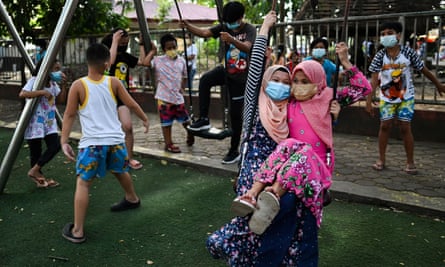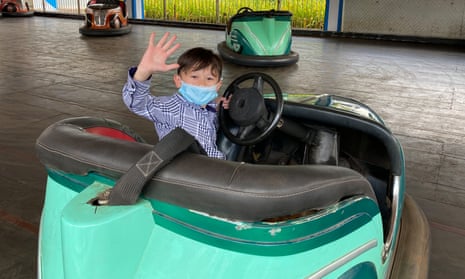Ten-year-old Gabriel Estrella beams as he talks about T-shirts he bought on his first day out at a shopping mall after nearly two years of staying away due to coronavirus restrictions in the Philippines.
“Before the pandemic, buying T-shirts used to be boring,” he said, sweaty after playing with his eight-year-old sister. “Now, it’s exciting! I bought four shirts. They’re anime shirts.
“I feel mostly happy that I can be social again because I felt I became really antisocial because of the pandemic.”
Gabriel and his sister Caitlin were among dozens of kids running around the grassy playground at a commercial complex in southern Manila, which was bustling with activity as families took their children out, one day after the government allowed it on 5 November.
Children can enter restaurants, toy stores, arcades and other shops in Manila for the first time since the pandemic began and the government imposed stay-at-home orders to combat the spread of Covid.
The easing of restrictions this month came as daily cases of Covid-19 declined and more people got vaccinated, although children under 12 are not yet being given jabs.
Gabriel and Caitlin’s parents, both doctors on the frontline of the fight against Covid, closely watched them and fixed their masks and face shields from time to time to make sure they were wearing them properly.
Their mother, Anne Estrella, a pulmonologist, said her children were showing signs of cabin fever so she and her husband, an infectious diseases doctor, decided to take them out.

“They questioned a lot of things,” she said. “We tell them that the virus kills people and they see people dying through our work. They understand that aspect. Still, they ask why it’s taking so long.”
Babies in strollers, girls on bicycles and scooters, boys jumping up and down, and children rolling on the grass were typical scenes at shopping malls, popular leisure spots across Manila.
Parents took photos and videos of their children as they enjoyed their day out, while also making sure they kept their face masks and face shields on.
Six-year-old Percy Zamora said his face mask itched but he was happy to wear it if it meant he could go out.
“We went to church and then rode a horse at the park so I’m very happy,” he said, while lined up with his 10-year-old sister Chloe for a quick ride on bumper cars at the amusement park by Manila Bay.
“I also want to ride a boat,” he said, giddy as the sound of the bumper cars being turned on drowned out his voice.

His father, Alfredo, says he and his wife will restrict their family outings to outdoor places for now while waiting for vaccines for their three children.
“It’s very sad seeing children not being able to enjoy their childhood. We sometimes feel sorry for our kids that they are not able to enjoy the outdoors as often as they want to.”
The toll of lockdown
Children in the Philippines have endured among the strictest lockdowns in the world, as the government has considered them high risk throughout the pandemic. In July, children were allowed to play outside in playgrounds and parks for the first time in more than a year.
As children in Manila take another step toward normality, concerns remain over the toll lockdowns have taken on their mental health. Psychology professor and clinical psychologist Anna Cristina Tuazon says children have wrestled with a range of emotions including isolation, depression and anger.
She said the pandemic had left some children with “nothing … to look forward to”.
Tuazon says mental health problems resulted from “underserved” development needs caused by the lockdown. “Children’s development requires a lot. They require physical space, physical activity, socialisation with peers,” she said.
While not all children will have been damaged by the experience, Tuazon says for some their socio-emotional development will have been “stunted”. She said even adults found their social skills regressed during lockdown.
“Imagine how it is for kids, when they don’t even have the foundation yet or the opportunities to develop these skills.”
Yet she stresses that any mental health impact on children was “not completely irreversible”, adding, “With proper attention, they can really bounce back.”

The Philippines’ department of health has reported about 2.8m Covid cases and more than 44,500 deaths. Daily cases have fallen to around a nine-month low but testing remains limited. Just below 30% of the total population has been fully vaccinated.
‘It’s back to normal’
For some parents, the risk from Covid still outweighs the need to give their children freedom from being kept at home.
Jill Cardenas, mother to seven-year-old Libby and four-year-old Miguel, says she would only consider taking their children to the mall and other indoor public areas once they had been vaccinated.
“I see the impact of the pandemic more on my eldest because she was already going to school and we had a routine on going out on the weekend before the lockdown,” she says. “Since then she’s become moody and restless.”
“My husband and I were out and he told me, ‘See, children can already go to the mall’,” she says. “Well, just because you can doesn’t mean you should. I can bring them outdoors, where there are less people.”
In one of the biggest malls in the country, already decorated for the Christmas holidays, Juvy Matic is all smiles looking at seven of her grandchildren posing for photos in front a toy store.
“Everyone’s super excited to be out, even us adults,” Matic said. “The children deserve this day out. They were surprised when we told them we were going out. They actually couldn’t believe it at first.”

While none of her grandchildren have received Covid jabs, Matic says she is not too worried about bringing them inside the mall, adding that the family was following all health and safety protocols to protect the children.
“I feel that the end of the pandemic is near,” says Matic, who works at a public market. “We just wanted to let them feel that Christmas is coming. And for one day, it’s back to normal.”
